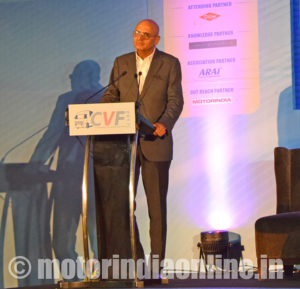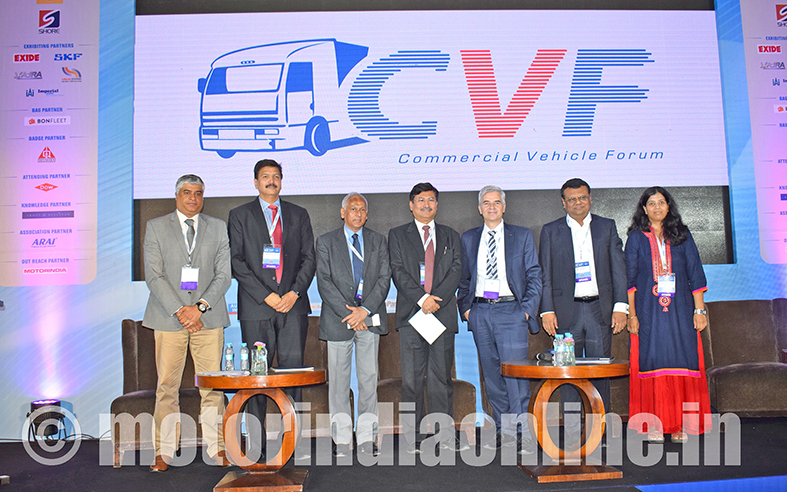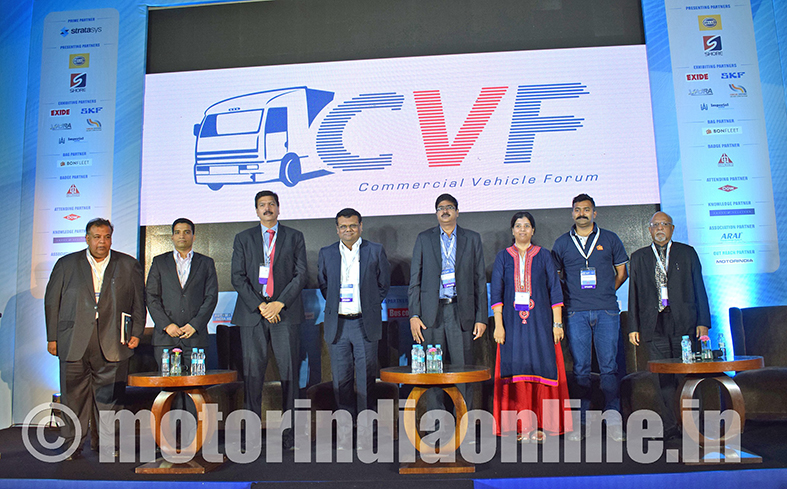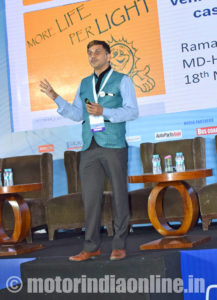The Commercial Vehicle Forum (CVF), an independent CV industry platform that aims at bringing together all the stakeholders for focusing on issues related to the CV business, was held in Pune for the second time on May 18. CVF 2017 was chaired by Mr. Nalin Mehta, MD & CEO, Mahindra Truck & Bus, who set the context with his keynote address and by declaring the forum proceedings open. The conference was attended by over 250 delegates, 35 industry leaders as speakers, over 10 sponsors and 10 media and association partners.

In his address, Mr. Mehta touched upon a variety of topics pertaining to the CV ecosystem. He began by reaffirming his strong belief in the growth of the CV industry by stating: “If you believe in the India growth story then you have to believe the CV Growth Story.”
He also spoke about the impact of GST, the likely scrappage policy and modernization of tolls, and highlighted the need to go digital and green. “When I think of load and passenger segment I think Green is the New Gold – In future Mobility we must be eco-friendly,” he said.
He also spoke about how 3D printing will disrupt the supply chain dynamics. Amid all the disruption happening in the industry, he observed: “The best way to predict the future is to invent it. I strongly believe that the future of the Indian CV industry will be invented at this forum and similar others.”
Evolving industry landscape
Business leaders from OEM, logistics, tech disruptors and large fleet owners participated in the forum, including Mr. Erich Nesselhauf – MD & CEO, Daimler India Commercial Vehicles Pvt. Ltd., Mr. Shyam Maller – Sr Vice President – Sales & Marketing, VE Commercial Vehicles, Mr. Keshab Chandra Sen – CEO & President, MLR Auto, etc. The transport and logistics side of the business was also represented with the presence of Mr. Shankar R – CEO, TVS Logistics, Mr. Prasanna Patwardhan – MD & Chairperson, Prasanna Purple Mobility Solutions, Ms. Kausalya Nandkumar – CEO, SmartShift, and others.

Mr. Erich Nesselhauf highlighted the importance of creating a pool of trained drivers to make that basic change in the way the industry operates and to make it efficient. He said: “It is also essential to focus on the ergonomics in trucks and a good air conditioning cabins is merely one of the pre-requisites of it. A comfortable truck driver will be a safe driver.”
Ms. Kausalya Nandkumar, CEO, SmartShift, a transport aggregator, reiterated her company’s commitment towards surface transporters. She said: “With our unconventional technology deployment, we eliminated the barriers to enter the market. We gave transporters the autonomy that they desire by choosing the right price for their cargo. Smart Shift’s reverse bidding feature has enabled their (transporters) growth and brought about change in the market. The transporters who have joined us have also been having effective communication with one another.”
Helping the audience understand the evolution of the Internet of Things (IoT), in another panel discussion, Ms. Farhana Haque, Head, Internet of Things, Vodafone India, said: “Due to the influx of IoT a lot of data is generated and organizations can derive useful information with correct comprehension of the data. In the automotive space, globally and in India, Vodafone helps customers gain insights into the data and help future product development. Some of the OEMs already have fleet management solutions and we at Vodafone will love to help them expand the scale in the industry. The OEMs are in the right direction as they address the challenges of asset tracking with connected platforms.”

Efficiency with technology
The one-day forum provided diverse agenda throughout the panel discussions. Themes and topics discussed ranged from IoT & Telematics, Fleet Management & Future of Mobility, and Sourcing & Cost Management to the use of advanced automotive manufacturing technologies and emergence of India as a CV production export hub. Interesting presentations were also made on 3D Printing Technology, Road Safety, Rubber Technology, etc., by representatives from Stratasys, Hella Lighting India and Shore Auto Rubber.
Addressing the audience, Mr. Ramashankar Pandey, CEO and Managing Director, Hella India Lighting Ltd., said: “We have organized various awareness activities in partnership with the Government and industry bodies and thus have come to be known as road safety activists. However, it is technology that has been the driving factor in the understanding of road safety as much as the evolution of lighting products for vehicles. Today LED offers an immense possibility of design and styling options due to its flexibility of application. Hella’s experience in electronics, thermal engineering and design ensure that these LED headlights and lighting systems provide consistent performances as well as increase vehicular safety.”
Another technology disruptor that intends to aid cashless fuel expenses by being the first petro card that will be acceptable at every pump in the country, regardless of the outlet was Mr. Bhaskar Kode, Founder & CEO, Bonfleet Solutions. He said: “Our ability to work with our finance partners behind the scenes and offer post-paid plans is one of our key strengths. It is not easy to become an exclusive cashless fuel card fuel pump chain agnostic. It is because of our vision to bring transparency to the fleet owner while the drivers fill fuel helped us connect the dots. Our expertise with technology ranges from issuing cards and managing KYC, authorizing or declining each swipe, credit underwriting and risk assessment, to settle and regulatory compliance, helped us create a new business model.”

On the panel discussion which dealt with leveraging automation and smart factories that can remain cost competitive, while delivering quality products, Lokesh Payik, Chief of Business (Industry 4.0), Robert Bosch, observed: “Digital manufacturing is a combination of physical with digital, which is marrying of virtual data analytics with the physical aspect of production to bring about efficiencies. Introduction of technology-driven concepts like augmented reality assisted maintenance, digital checks on the health of vehicles, etc., leads to time savings, reduction in instances of breakdown, better preventive maintenance and improved productivity as well as profitability.
The Forum ended on a positive note, and the organizers of the event – Threefold, also announced CVF 2018 to take place in Pune in June 2018. Mr. Rohit Dewan, Project Director, CVF, also called for speakers and delegates – policy makers, OEMs, logistics service providers and auto component suppliers – to work together so that the CV industry receives the desired focus and is not an afterthought.